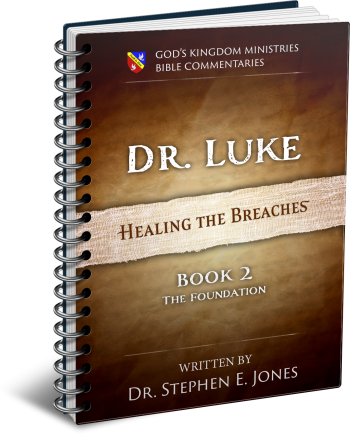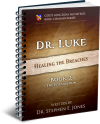Latest Posts
View the latest posts in an easy-to-read list format, with filtering options.

This book covers Luke 4-6, expounding on Jesus' baptism and early ministry. Jesus called twelve disciples and set forth the basic principles in the Sermon on the Mount.
Category - Bible Commentaries

I have heard some say that Jesus broke the law, and they point to the Sabbath incidents in the New Testament as proof. Their motive is to try to prove that Jesus put away the law. It is clear to me, however, that Jesus’ words in Matt. 5:17-19 shows Jesus’ denying such charges. Those who claim that Jesus violated the law are agreeing with the charges made by the scribes and Pharisees. I prefer to take Jesus’ side in this dispute.
The first Sabbath controversy in the book of Luke is recorded in Luke 6:1-5,
1 Now it came about that on a certain Sabbath He was passing through some grain fields; and His disciples were picking and eating the heads of grain, rubbing them in their hands. 2 But some of the Pharisees said, “Why do you do what is not lawful on the Sabbath?” 3 And Jesus answering them said, “Have you not even read what David did when he was hungry, he and those who were with him, 4 how he entered the house of God, and took and ate the consecrated bread which is not lawful for any to eat except the priests alone, and gave it to his companions?” 5 And He was saying to them, “The Son of Man is Lord of the Sabbath.”
Some think this issue was about stealing grain, but the Pharisees were actually accusing His disciples of working on the Sabbath. The Pharisees would not have questioned Jesus if His disciples had picked grain on any other day. One of the “welfare” laws of the Bible allows the hungry to pick grain or eat grapes as they pass by, as long as they do not carry away a basket full of grapes or use a sickle in the grain field. We find this law in Deut. 23:24, 25,
24 When you enter your neighbor’s vineyard, then you may eat grapes until you are fully satisfied, but you shall not put any in your basket. 25 When you enter your neighbor’s standing grain, then you may pluck the heads with your hand, but you shall not wield a sickle in your neighbor’s standing grain.
This law cannot easily be implemented in a Babylonian society, for the beast kingdoms of men deny men the right to own property. Rights cannot be taxed, because they are granted by God. Only government privileges can be taxed, and since we have property taxes, the present form of government treats the ownership of property as a privilege granted by government, not as a right granted by God.
In the Kingdom of God, all families are given an inheritance in the land. Hence, they all have opportunity to grow their own food. This law greatly reduced poverty and hunger. But in a Babylonian society, where such land inheritance is not recognized as a divine right, many are displaced. If they should make it legal for travelers to take some grapes from another man’s vineyard along the path, the farmer might soon be stripped bare.
Each law of God is co-dependent upon all of the other laws to function properly.
Jesus’ disciples were exercising their divine rights when they picked some grain, removed the chaff by rubbing it between their hands, and then ate it. This was probably barley grain, whose chaff is easily removed, because wheat would require threshing. So this event probably took place near the feast of Passover when barley is ripe. The KJV uses the term “corn,” which was an old English word applied to any grain. In more modern times “corn” came to apply to the primary grain found in the New World, maize.
Luke 6:1 (KJV) reads, “And it came to pass on the second Sabbath after the first.” This alternate rendering was based on the Vatican manuscript which includes the Greek word deuteroprotos, literally, “second first.” It refers to the second Sabbath in a row, that is, a weekly Sabbath that follows a feast-day Sabbath—in this case, Passover. When Passover fell on a Friday, it was the first Sabbath, and the next day was deuteroprotos, the second Sabbath in a row.
Hence, the Vatican manuscript dates the event on Abib 16, the day after Passover and the second day of Unleavened Bread. This would positively identify the grain as barley, since wheat ripened about six weeks later, just in time to be a new meal offering at Pentecost.
However, the NASB does not consider deuteroprotos to be in the best or oldest manuscripts, and so it leaves out this word. Likewise, the notes in The Emphatic Diaglott tell us to omit it. In checking with Panin’s Numeric New Testament, he omits it as well on the account of the word destroying the numerical patterns of the text itself.
The Pharisees had no problem with hungry men picking grain along the road, but they had determined by their traditions of men that such action was “labor,” and should not be done on the Sabbath. In other words, it was better to go hungry on the Sabbath than to pick a few grains or grapes to eat. Jesus differed with them, and so began a steady stream of charges against Him for violating the Sabbath.
When questioned, Jesus answered the Pharisees with a question of his own, a question which no doubt had stumped them for centuries. Jesus reminded them that David ate the showbread when he was hungry, “which is not lawful for any to eat except the priests alone” (Luke 6:4). So was Jesus excusing Himself by charging David with violating the law? Is it true that a wrong shared is half right?
Some have argued that since David broke the law, it set the precedent for Jesus to do so as well. But this was not Jesus’ intent. In fact, though some think Jesus had the right to violate the law because He was the Mediator of the New Covenant, few would argue that David enjoyed the same right during the time that the Old Covenant was in force.
So why did Jesus bring up David’s apparent violation of the law when he ate the showbread? The answer is found in Psalm 110:4, where God tells David,
4 The Lord has sworn and will not change His mind, “Thou art a priest forever according to the Order of Melchizedek.”
The fact is that David was indeed a priest, though not of the Levitical order. In fact, in his day he was the high priest of that Order, for he was a type of Christ, the King-Priest. He merged the Scepter with the Priesthood.
Therefore, Melchizedek priests had the right to eat the showbread. David’s companions shared the same right with their high priest, because they served him and were therefore considered priests under their high priest, David.
In Jesus’ day, the right of priests even extended to Nazirites, even if they were not descended from Levi or Aaron. For this reason, Jesus’ half-brother, James, who was the head of the Jerusalem church, was allowed to enter the temple, where he prayed daily for the nation. (See chapter 25 of my book, Lessons from Church History, Vol. 1.) Bishop Eusebius quotes Hegesippus, who wrote about James,
“… [T]here were many Jameses, but this one was holy from his birth; he drank no wine or intoxicating liquor and ate no animal food; no razor came near his head; he did not smear himself with oil, and took no baths [in the public bath houses]. He alone was permitted to enter the Holy Place, for his garments were not of wool but of linen. He used to enter the Sanctuary alone, and was often found on his knees beseeching forgiveness for the people, so that his knees grew hard like a camel’s from his continually bending them in worship of God and beseeching forgiveness for the people…”
So if Nazirites were considered on par with Aaronic priests, it is no stretch to see that the Melchizedek priests too could participate in the privileges normally afforded only to Aaronic priests of Levi.
In fact, in this we see how genealogy is subservient to the law and is not nearly as exclusive as some would have it. The Melchizedek priesthood was an Order that did not require its priests to be of a particular genealogy. Heb. 7:12-17 discusses this very issue, telling us that both David and Jesus were of the tribe of Judah, not Levi:
12 For when the priesthood is changed, of necessity there takes place a change of law also. 13 For the one concerning whom these things are spoken belongs to another tribe, from which no one has officiated at the altar. 14 For it is evident that our Lord was descended from Judah, a tribe with reference to which Moses spoke nothing concerning priests. 15 And this is clearer still, if another priest arises according to the likeness of Melchizedek, 16 who has become such not on the basis of a law of physical requirement, but according to the power of an indestructible life.
Heb. 7:26 goes on to tell us that “it was fitting that we should have such a high priest,” showing that Jesus is the High Priest of the Melchizedek Order. He came fully into His office at the death of John the Baptist, who, I believe, was the previous high priest of that Order. John, being an Aaronic priest as well, was the transitional office holder between Aaron and Melchizedek.
Not only David, but Jesus as well had the lawful right to enter the Sanctuary and to eat of the showbread. David’s men also had that right, as did Jesus’ disciples. They were all of the Order of Melchizedek, because they served the high priest of their Order.
Since the coming of Christ, we have a high priest with an endless or “indestructible” life (Heb. 7:16). The Greek word is akatalutou, which The Emphatic Diaglott renders “enduring” and “imperishable.” The writer did not use the word aionian, which meant an indefinite and unknown period of time. The imperishable life of Christ was known positively to be unending. There was nothing indefinite about it.
Because Jesus is the legitimate High Priest recognized by the Father, He will not lead an Aaronic priesthood in an earthly temple in Jerusalem. Those who think that Jesus will return to minister in an earthly temple along with men whose names are derived from Cohen, or “priest” of Aaron, are mistaken. Melchizedek will never be replaced by Aaron, for His is an enduring priesthood that has been divorced from genealogy.
But why did Jesus bring up David when He was accused of violating the Sabbath? The answer is given in Luke 6:5,
5 And He was saying to them, “The Son of Man is Lord of the Sabbath.”
It is not absolutely clear if Jesus actually mouthed those words to the Pharisees, or if this was merely the lesson that He was really trying to say. Either way, however, this was the bottom line. He was presenting Himself as the High Priest of Melchizedek, showing that He had the rights of priesthood even as David and his men had enjoyed while eating the showbread.
As the legitimate High Priest, Jesus claimed to be the highest and final Authority to determine what was lawful and unlawful in regard to the Sabbath.